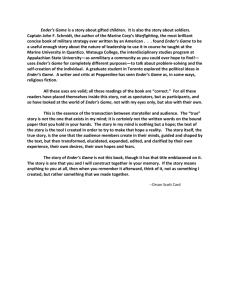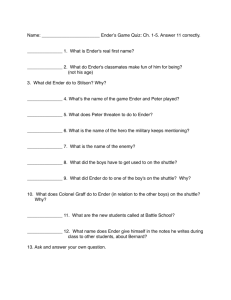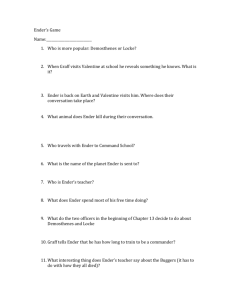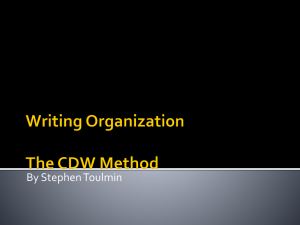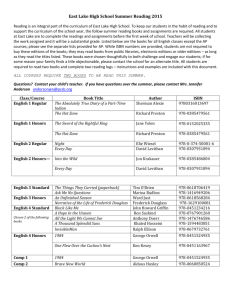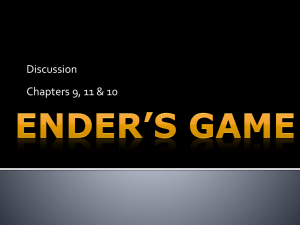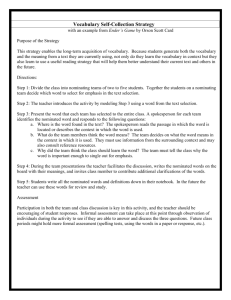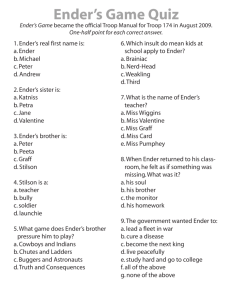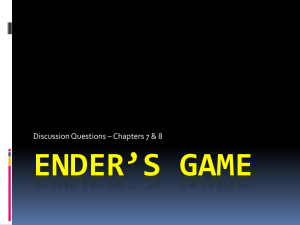Study Guide for Ender's Game by Orson Scott Card
advertisement
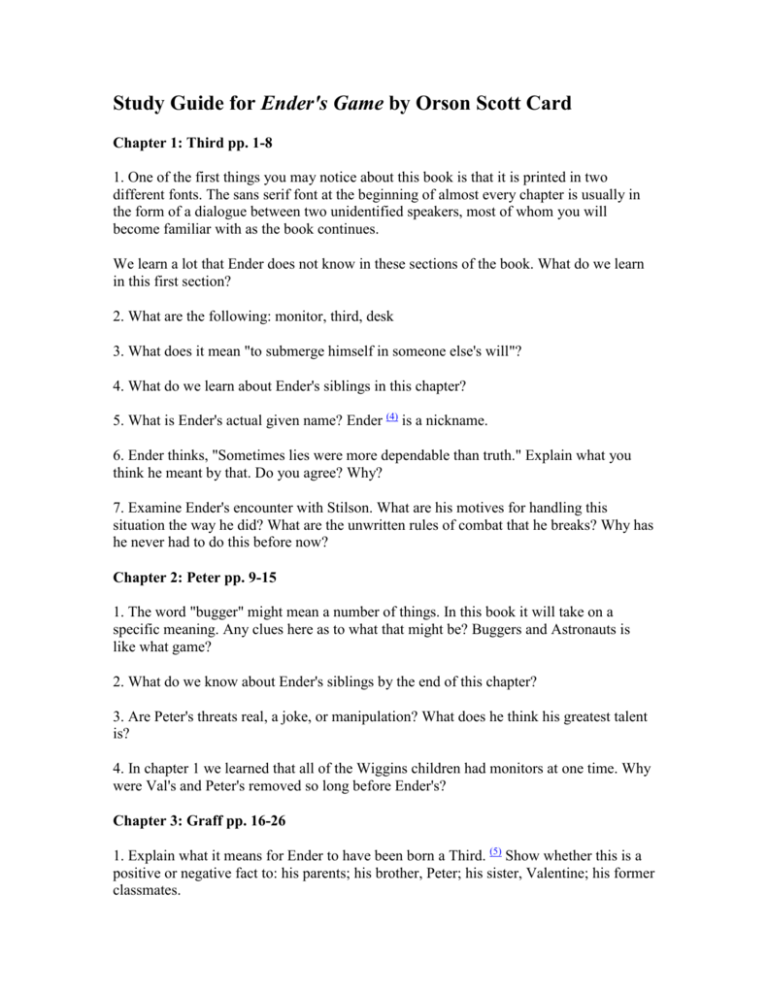
Study Guide for Ender's Game by Orson Scott Card Chapter 1: Third pp. 1-8 1. One of the first things you may notice about this book is that it is printed in two different fonts. The sans serif font at the beginning of almost every chapter is usually in the form of a dialogue between two unidentified speakers, most of whom you will become familiar with as the book continues. We learn a lot that Ender does not know in these sections of the book. What do we learn in this first section? 2. What are the following: monitor, third, desk 3. What does it mean "to submerge himself in someone else's will"? 4. What do we learn about Ender's siblings in this chapter? 5. What is Ender's actual given name? Ender (4) is a nickname. 6. Ender thinks, "Sometimes lies were more dependable than truth." Explain what you think he meant by that. Do you agree? Why? 7. Examine Ender's encounter with Stilson. What are his motives for handling this situation the way he did? What are the unwritten rules of combat that he breaks? Why has he never had to do this before now? Chapter 2: Peter pp. 9-15 1. The word "bugger" might mean a number of things. In this book it will take on a specific meaning. Any clues here as to what that might be? Buggers and Astronauts is like what game? 2. What do we know about Ender's siblings by the end of this chapter? 3. Are Peter's threats real, a joke, or manipulation? What does he think his greatest talent is? 4. In chapter 1 we learned that all of the Wiggins children had monitors at one time. Why were Val's and Peter's removed so long before Ender's? Chapter 3: Graff pp. 16-26 1. Explain what it means for Ender to have been born a Third. (5) Show whether this is a positive or negative fact to: his parents; his brother, Peter; his sister, Valentine; his former classmates. 2. In this chapter Ender explains his assault on Stilson. Quote his reasons. 3. Meet Colonel Hyrum Graff of the International Fleet. His is one of the voices you've been hearing at the beginnings of the chapters. From Graff we learn a lot of background. What about - prenatal gender selection - state control of conception - the role of religion in this culture - the Bugger invasions 4. What are Ender's reasons for deciding to go to the Battle School? This is not a simple question. He has several reasons. 5. Who is Mazer Rackham? Chapter 4: Launch pp. 27-36 1. Explain the following quotation from page 27. "Isolate him enough that he remains creative - otherwise he adopt the system and we'll lose him." Your answer should include the words isolation, adopt and lose. 2. We are also told that "breaking geniuses" makes them better people. Do you see this as true or false. Explain your answer. 3. 'He did not know its significance at the time. Later he would remember that it was even before he left Earth that he thought of it as a planet, like any other, not particularly his own." Why might this be significant? 4. How does Graff go about isolating Ender in this chapter? 5. How does the incident with the other cadet mirror the Stilson episode? How does Ender feel about this? Look back.. How did he feel about Stilson? Chapter 5: Games pp. 37-53 1. What games are being played in this chapter. (Hint - more than just the ones in the game room.) 2. Examine Ender's dealings with Bernard. He destroys him. How does he do it? Why? 3. What do we learn about the place from Mick? He is provided as an example of a certain type of Launchy. What type is that? 4. We are told that being homesick is not acceptable for heroes in training. Remember, Ender is 6; the other boys are around the same age within a year or two. Does this mean that heroes are not supposed to have the same feelings as other people, or that they are supposed to be beyond them? 5. "He can never come to believe that anybody will ever help him out, ever. If he once thinks there's an easy way out, he's wrecked." "He can have friends. It's parents he can't have." What happens to children who don't have good role models? 6.. Ender's ability with computers was foreshadowed in chapter 1. What did he do there? Do you think his choice of "God" for the mystery student file is appropriate? What does it suggest to everyone who sees it? 7. Why is Ender so very careful about his relationship with Shen? Chapter 6; The Giant's Drink pp. 54-65 1. This chapter introduces the virtual reality game the kids play on their desks, The voices call it the Mind Game. We learn that failure in the game can have serious consequences in the real world. What has happened in some cases? 2. This chapter also introduces the battleroom, where much of the action in the seven chapters will take place. What makes Ender especially able to function in this zero gravity environment? What are the important things he and Alai learn during this first session? How do the suits and the guns work? 3. What are the signs that it is Alai, not Bernard, who is the leader of this launchy group? 4. One of the voices at the beginning said, "That launch is sick, and he (meaning Ender) is the source of the disease." What are the signs of this sickness? How is it cured? What role does Alai play in this? 5. What seems to be the purpose of the Giant's Game? What do the rules appear to be? How does Ender finally get past this part of the mind game? What do you suppose the "lesson" might be? THIS CHAPTER MARKS THE CONCLUSION OF ENDER'S FIRST PHASE OF EDUCATION AT THE BATTLE SCHOOL. THIS IS A GOOD PLACE TO PAUSE, REGROUP AND TEST. Chapter 7: Salamander pp. 66-96 1. Who does Ender meet in this chapter? Briefly describe any characters that seem important to you and you would expect to see again. 2. What are the key events in this chapter? By now you will have noticed Card's device of breaking a large chapter up into bite-sized scenes, the breaks being indicated by a line ( ). Each scene tends to have its own little plot structure. That also means it's easy for you to pick out the key events. 3. Speaking with Petra, Ender silently identifies adults as enemies (p. 85). Is this a logical conclusion for him to have drawn? Explain. (Think back to what the voices said on p.38.) 4. In hitting Ender, Bonzo actually loses face rather than keeping it. Ender is right. How does he know it? 5. There is foreshadowing in this chapter. Where do you think it can be found? Chapter 8: Rat pp. 97-119 1. Define the terms xenophobia and genocide. What is the significance of each word in the context of this novel? 2. How is Ender received by his new army, Rat? 3. On pages 106-111, Dink discusses childhood and the games being played. Summarize his thoughts. 4. This chapter opens with a dialogue between Graff and Anderson. Graff says that "Fairness is a wonderful attribute. it has nothing to do with war." What is the point of their discussion? What decisions are being taken by those who run the Battle School? 5. The Hegemony and the Strategoi are the political and military leaders of Earth. Why would Anderson leave himself the option of communicating with them? 6. The face in the mirror represents a personal crisis for Ender. Whose face is it? How many other times has he looked deeply at himself and been afraid that this person is who he really is? You need to skim back through all the earlier chapters to get this. Chapter 9: Locke (6) & Demosthenes (7) pp. 120-153 1. This is the first chapter in which we have spent time with someone other than Ender (not counting the chapter openings, of course). What effect does this have on the story? 2. Why did the Wiggin family move to the country? Is it working? 3. What is Peter's scheme and why does Valentine agree to it? 4. What internal crises does Ender face and how does he respond to them? 5. What are the important plot complications in this chapter? 6. What is hegemony? 7. Why does Graff approach Valentine? 8. Summarize the events that occur when Ender plays the mind game. Chapter 10: Dragon pp. 154-172 1. You may have noticed that Ender is never allowed to become too comfortable before his life is shaken up. What speech of Graff's shows the inner turmoil that he feels about this situation? Why does he do it any way? 2. Ender is given Dragon army. What is the significance of this? How old is he now? 3. How is the relationship between Ender and Bean like the relationship between Graff and Ender? 4. What are Ender's internal conflicts in this chapter? How does he resolve them? 5. The change in Ender's status is demonstrated by the scenes with Alai. Take a look at p. 170 and explain what is happening here. 6. What is Ender's vow at the end of the chapter? How does this fit in with Graff's and Anderson's plans for him? Chapter 11: Veni Vedi Vici (8) pp. 173-199 1. Once again we learn things from the opening dialogue. a. What are they planning to do to Ender's army? b. What is Graff worried about? c. What is the political situation back on Earth? 2. "My eagerness to sacrifice little children in order to save mankind is wearing thin." Who says this? What does he mean? 3. What are the main differences between Ender's strategies for the game and those used by other commanders? 4, Ender has two objectives for this first battle. How does he meet them? 5. The next battle is against Phoenix Army. What is unusual about the timing of this battle? What happens after this? What has happened to the old ways of the battle School? When did we learn that this was going to happen? 6. Why does Ender decide to start exploring the old videos? What does he learn from them? From whom does he learn strategy? 7. What is really unusual about the battle with Salamander Army? "This had not been a fair fight, even though they had won - the teachers had intended them to lose ..." 8. What foreshadowing (hint: Bonzo) do you find in this section? 9. What is the relationship between Ender and Bean? (9) It's interesting that the last part of this chapter is from Bean's point of view. How does Bean see Ender? 10. Ender tells Bean the real purpose of the game. This has been hinted at for us since the opening dialogue for chapter 8. Look back and see how Graff's argument confirms Ender's conclusions. The Game, the standings, the fairness (or unfairness) - none this matters. The Game's purpose is simply to do what? Chapter 12 - Bonzo pp. 200-226 1. There are really three big events in this chapter, though there are some smaller ones that go with them. What are these sections? Make up one-word titles (like Card's) to name these sections. 2. In some ways this chapter is like chapter one. How? 3. As Ender's training continues, the people in charge of the Battle School make some serious changes in how the battles are organized and run. What are the major changes in this chapter? 4. What are the reactions shown by the following characters to Ender's demolition of Bonzo: Dink, Bean, Ender, Colonel Anderson. 5. How surprised were you to learn about what actually happened to Bonzo? How much more surprised were you to learn about Stilson? Why did they keep this knowledge from Ender? Chapter 13 - Valentine pp. 227-254 1. What is the official reaction to finding out who Locke and Demosthenes are? What are the good and bad points as far as the voices are concerned? (We don't actually know who is talking in this segment.) 2. How does Valentine feel about being Demosthenes? 3. Why does the IF need Valentine this time? What's wrong with Ender? 4. Ender tells you the secret of how he manages to win all the time. What is it? (p. 238) How is this related to Peter's (p. 131) special ability and Valentine's (p. 127)? 5. The meeting between Valentine and Ender goes through several stages. Try to break it down into sections. Looking at the issues that Ender raises as reasons should help you. 6. After Ender has made up his mind what to do, Graff tries to explain to him why he brought him back to Earth and let him take three months to make up his mind. What connection does Graff want Ender to make? 7. There are a lot of secrets related to this Human-Bugger war. (10) One of them is the place where Ender is going. How is this secrecy underlined for us? 8. How did humans learn that faster than light, instant communication was possible? 9. What is the secret of the Third Invasion? 10. "If the other fellow can't tell you his story, you can never be sure he isn't trying to kill you." Why can't the two races communicate? Why is this important? What are three reasons that have been given for the buggers attacking Earth. 11. Valentine says, "Killing's the first thing we learned. And a good thing we did, we'd be dead and the tigers would own the earth." Graff says, "Nature can't evolve a species that hasn't the will to survive ... the race as a whole can never decide not to exist." How does this apply to the decision Ender has to make? Chapter 14 - Ender's Teacher pp. 255-304 1. How is Eros (11) different than the Battle School? - Ender's training? - His social activities? - Opportunities for comradeship? 2. How did they manage to keep Mazer Rackham around for 70 years so he could be Ender's teacher? What did it cost him? 3. What things did humanity learn from the buggers? 4. How did Rackham win the second war? 5. Why would buggers not see killing individuals the same way humans would? 6. What is Dr, Device? 7. After Ender and his squad have been thoroughly trained, Rackham tells him that he will be their enemy in the simulations from now on. What is the truth of this? 8. What are some of the signs that the constant pressure is wearing on Ender and his squad leaders? 9. Were you surprised to learn the truth behind Enders' mock battles? Graff explains the training strategy on page 298. 10. What happens on Earth as soon as the Bugger War is over? Were Peter and Valentine right? Why is Ender potentially in danger? 11. The kids finally get to express their opinions at the end of this chapter. What do they think will happen to them? Chapter 15 - Speaker for the Dead pp. 305-324 1. Note: This is also the title of the book which continues Ender's story. Card warns you in the introduction to Ender's Game that the other three books (Speaker for the Dead, Xenocide, Children of the Mind) are quite different. This one sets up situations which will only be fully developed in the next book. 2. This chapter begins with another dialogue, only this time it's presented as a regular narrative. Why has the style changed? What important changes are about to take place on Earth? 3. Note: On page 309 the squad begins to break up. Earth doesn't get Ender, but all of his squad leaders are taken and used almost as soon as they get back to Earth. For this part of the story, which occurs in between this page and the rest of the book, you will have to read Shadow of the Hegemon and Shadow Puppets. (12) They tell the story of Ender's Dragon, as his battle squad came to be known. 4. It's not often that a writer will provide such a long epilogue, or conclusion, at the end of a novel. Generally there's a climax - BANG! - and just a little bit of mopping up afterwards. This is not the case here. What are the significant developments in this chapter? 5. Why did Val (using her Demosthenes persona) make it so that Ender could not go back to Earth? What is her plan? What is Ender's objection to it? 6. According to the discussion between Val and Ender, how did this book get to be written? 7. Eight years after they reach their colony world, Ender gets a big surprise. What is it? 8. The Hive Queen's communication with Ender confirms Rackham's theories about why they invaded and takes them a little further. What does Ender learn? What is Ender's response? (There are two things.) FOOTNOTES 1 Hugo - an award named for Hugo Gernsback, one of the first SF magazine editors. It is voted on by fans and presented annually at the World Science Fiction Convention. 2 Nebula - an award voted on by professional writers, members of the the Science Fiction Writers of America, which also includes non-Americans among its members. 3 This story, with the same title as the novel, is available in a recently published book of short stories called First Meetings. The other stories tell about Ender's mother and father, as well as a little of what happened to Ender later on, after this novel. The short story alone can be read at www.hatrack.com, if you are interested, but don't read it until after we finish the novel, because it contains material which would spoil the ending. 4 Twenty-two years after the story of Ender Wiggin first appeared in print, Orson Scott Card learned that the name "Ender" really exists - in Turkish. The name means "one in a million" or "something that is rarely found" - an extraordinarily appropriate name for Ender Wiggin. Card affirms, however, that he had no notion that the name actually existed in any language - he coined it only to allow the title "Ender's Game" to be reminiscent of "endgame" in chess. The correspondent who informed Card of the meaning of the name is himself named Ender. "Many people are named …nder in Turkey," he writes, "so Ender is a rare name even in Turkey." 5 Zero Population Growth: The limiting of population increase to the number of live births needed to replace the existing population, about 2.54 births per family. (The American Heritage Dictionary online) Also an organization dedicated to promoting this birth rate world wide. 6 John Locke - English philosopher of the 18th century, whose work focused on enlightenment, the limits of human knowledge and a study of what he called the social contract between people and their governments, which would have been mostly kings at the time. 7 Demosthenes - Famous Greek statesman in Athens around the 4th century BC. he wrote speeches arguing that his city-state needed to defend itself against an outside enemy, Philip II of Macedon. 8 Veni Vedi Veci - These words were supposed to have been spoken by the Roman general Julius Caesar and recorded in his journals after he conquered Gaul (France) in 51 BC (or BCE). Literally translated they mean, "I came, I saw, I conquered." This is a rather arrogant statement, indicating that Caesar found it that simple. 9 If you want to know more about this, Bean is the central character of a later book called Ender's Shadow. 10 This is later referred to as The Formic War in the other books that use this background. 11 Some irony for you: Eros is one of the names for the Greek god of Love who is otherwise known as Cupid. (Yes, there is a goddess of love, as well.) 12 Ender's Shadow will just give you this story again, but from Bean's point of view.
